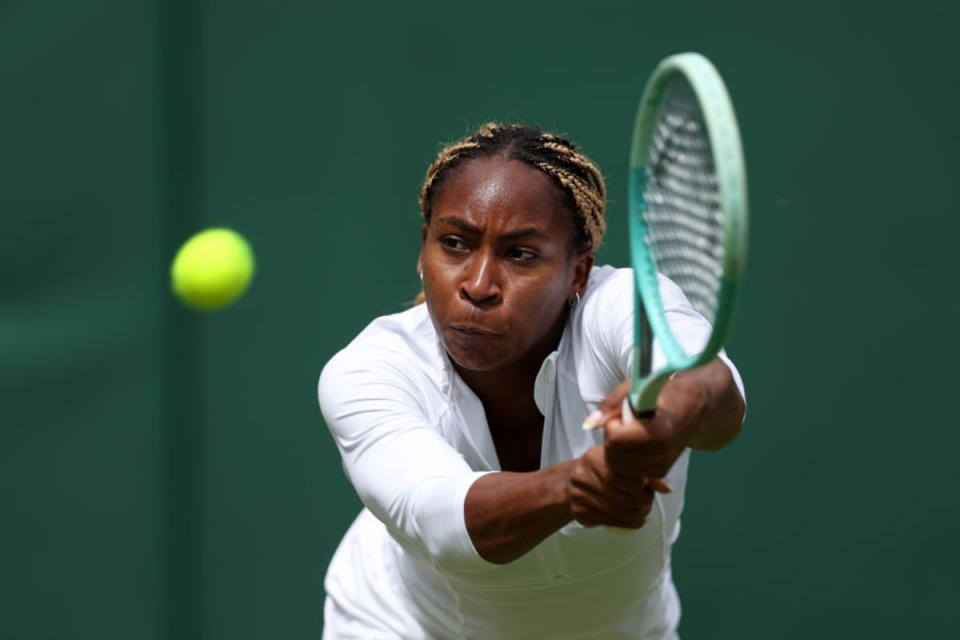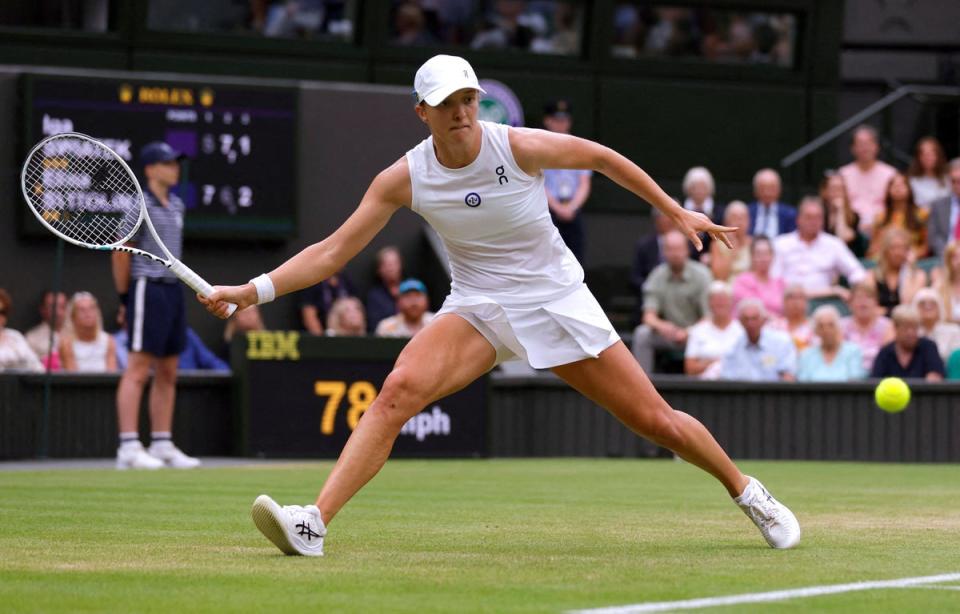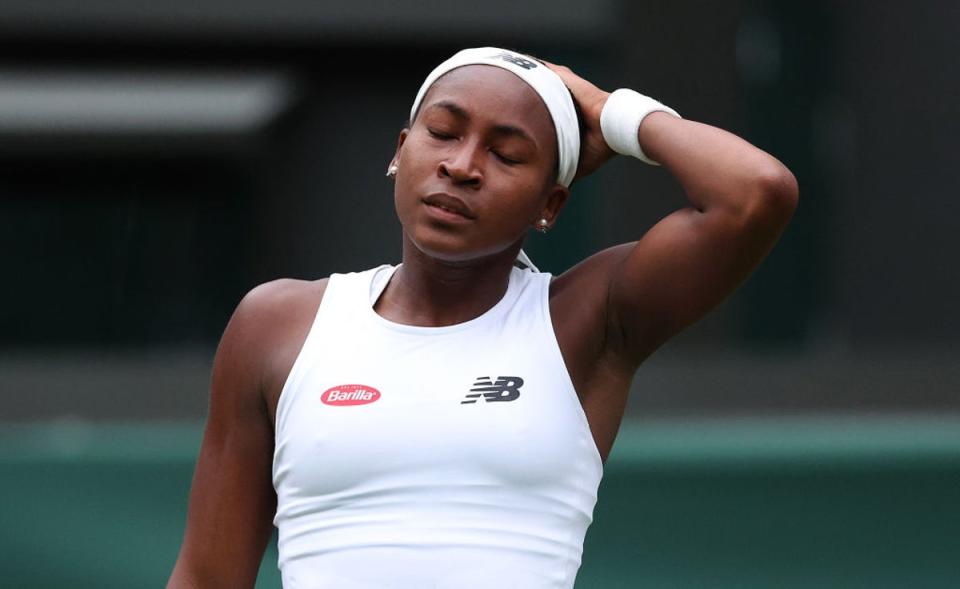The seven-year streak that could point to this year’s Wimbledon champion

Coco Gauff couldn’t help noticing it as she arrived at Wimbledon and walked past the champions’ wall. On the grass-courts of SW19, the past seven tournaments have produced seven different winners of the women’s title, and not all of them have been the usual names, either. “Sometimes this tournament looks a little bit different,” said the world No 1 Iga Swiatek. “Players that are also sometimes underdogs can win it, I feel. The chance is bigger.”
If last year brought history as Marketa Vondrousova became the first unseeded player to win the Championships in the Open era, there is a sense that Wimbledon could produce another unlikely champion this year.
Certainly, there isn’t a player in the draw who carries the weight of Swiatek at the French Open, where the Pole last month won a third title in a row, looking unbeatable on her favourite surface. But the transition from clay to grass has proved challenging. Swiatek’s preparations weren’t helped by having to withdraw from her only warm-up tournament on grass in Berlin, as she cited “overall physical and mental fatigue” following her dominant clay-court stretch.
Swiatek’s struggles to adapt are part of a wider theme and help explain why Wimbledon has not seen a dominant women’s champion since Serena Williams. Ash Barty could have been one after her title in 2021, but the closest the Australian will get to singles trophy this year is by working as a pundit for the BBC. In the two years since Barty’s title, there have been surprise champions in Vondrousova and Elena Rybakina.
“I think you really have to approach this tournament a little bit differently mentally,” Swiatek suggested, as if offering advice to herself. “Usually players on the women’s side, I guess they are making a little bit more mistakes than on other surfaces because the ball is low and it’s pretty fast and it’s tricky. I guess it comes down more to the mental side, I would say, how you’re going to be able to adjust to this surface. The player that does it better is going to win.”

Vondrousova, for a start, needs to rediscover that feeling. The Czech returns to Wimbledon seeded sixth this time but has not won a title since last year. Vondrousova, with a first-round exit at the Australian Open and a 6-2 6-0 defeat to Swiatek in the French Open quarter-finals this season, will hardly carry the aura of a Wimbledon champion when she opens play on Centre Court on Tuesday,
The question though, is who does at Wimbledon? Gauff, now five years on from her run to the fourth round as a 15-year-old, is back at Wimbledon as a grand slam champion and world No 2, but couldn’t help paying attention to the lack of a clear favourite. “I think for me it just shows there’s a lot of talent on the women’s tour and it’s anybody’s game,” she said. “It gives you confidence obviously when you see that the field isn’t stacked. I think everybody has an equal shot and it’s just about who can perform better that week.”
Gauff, though, is now expected to be one of the contenders as she returns to Wimbledon having firmly left those teenage years behind her. One of the pivotal moments in Gauff’s ascension to becoming a grand slam champion at the US Open came in her first-round defeat to Sofia Kenin at Wimbledon last year. It was a brutal blow for Gauff, leaving her in a “dark place”, but one that forced her to go back to the drawing board. “Oh, man,” she said. “I wish a year ago, me after that match could see me now. I think I’ve just grown a lot.”

Swiatek’s tough draw is highlighted by the fact that she is now facing Kenin, the former Australian Open champion, in the first round. From there, Swiatek has landed in the same section as Vondrousova and Rybakina, another former Wimbledon champion. Rybakina, who returns as the fourth seed, may be a contender but maintaining her form across the two weeks of a grand slam has been her biggest issue over the past year.
Aryna Sabalenka, meanwhile, has become accustomed to cruising through the early rounds of a grand slam but her struggles with a rare shoulder injury since retiring in Berlin suggests she could be in for a battle from the start. Sabalenka, with a Wimbledon semi-final last year, a second grand slam title under her belt and a fair draw in front of her, might have felt that she could have taken another step this time, but her condition may rule otherwise.

Others are in need of some inspiration from the past: Ons Jabeur has been the runner-up in the last two finals but the popular Tunisian’s form has not recovered since that heartbreaking defeat to Vondrousova in last year’s final, one that took on extra significance after she revealed she would have taken a break from tennis to become a mother had she won.
After taking a wildcard, Emma Raducanu will make her Wimbledon return against the 22nd seed Ekaterina Alexandrova on Centre Court on Monday. The 21-year-old has relished the idea of another “new start”, having sealed her first-ever win over a top-10 opponent, against the world No 5 Jessica Pegula at Eastbourne, but set her sights considerably lower than her US Open title three years ago.
"If I get through my first round, I’d be over the moon," said Raducanu. “I’m expecting a really difficult match. I think it’s a match where I’m actually the complete underdog because she’s a lot older, a lot more experienced, and ranked a lot higher. I feel like it’s just a great opportunity to try to get a good scalp, try to enjoy playing how I have been in the last few weeks, and just get back into it."
